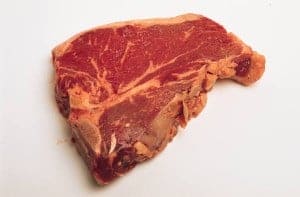 Red meat is back in the news , and once again it’s being singled out as being uniquely bad for you. Here’s the sound bite: Eating red meat increases stroke risk while eating poultry reduces it. But, there’s a little bit more to the story. (There usually is.)
Red meat is back in the news , and once again it’s being singled out as being uniquely bad for you. Here’s the sound bite: Eating red meat increases stroke risk while eating poultry reduces it. But, there’s a little bit more to the story. (There usually is.)
First of all, the 28% increase in stroke risk applied to people eating more than half a pound of red meat a day. That’s two or three servings of red meat every single day–or twice the average amount of red meat consumed by Americans. Surely that should be part of the story.
But here’s what really makes me crazy. Researchers admitted that they were surprised that eating more fish didn’t seem to reduce stroke risk–but were quick to point out: “There’s a lot of variation in how people cook and prepare fish, and we couldn’t get down to that level.”
Wait a minute. What about the variation in how people cook and prepare red meat? When the results don’t line up with our preconceived notions (fish: good), we cite unaccounted-for variables. But when the data show what we expected them to (red meat: bad), the same variables don’t seem to play a role?
Does anyone else detect a white hat bias?
Related content:
Red meat and Colon Cancer Risk

Thanks for the article, I wonder what TYPE of red meats they are referring to, if high sodium processed products are grouped with lower sodium, lean meats – a study design error often resulting in biased results. Food for thought.
Exactly, Nicolette. In these dietary pattern studies, Big Macs and grass-fed bison steak are in the same category.
Judging by the various apologetic entries you have written on red meat, it seems that your own preconception, i.e., that red meat isn’t as harmful as studies indicate it may be, leads you to make your own unsubstantiated handwaving conjecture. That is, you point out _possible_ flaws and biases in studies whose findings you don’t like without providing proof yourself.
Actually, it’s the inconsistency that bothers me here. The researchers bracket the null findings on fish (“we weren’t able to tell how the fish was prepared”) but don’t seem to acknowledge that the same unknown variable could play a role in the findings on red meat–at least not in the mainstream press.
I want to apologize for the tone of my earlier comment.
Monica, have you ever encountered data that would support red meat (anu type) as healthy choice in terms of strokes or heart attacks? Would be nice to know, even surrogate data if it exists.
These data suggest that moderate consumption of red meat (2 or 3 times a week) is not linked to any increased risk. However, my reservations about the specificity of the observed effect remain the same.
Excellent analysis, as always. To me, inconsistency in science is every bit as maddening as hypocrisy in politics.
One must also always consider the source of the data. Experiments run by or funded by a concerned party (meds by BigPharma or milk by the Dairy Industry for example) are often biased and in the case of BigParma have been caught with their hand in the cookie jar too many times to be trusted. I no longer trust any statements made by the AMA (remember the statement that tobacco prevents cancer?), the FDA (aspartame, a known excitotoxin is still on the market) or the American Cancer Society (really misleading statistics on cancer survival) any more. One has to look for experiments run by independent, unbiased and unpunished sources and lots of luck on finding those.